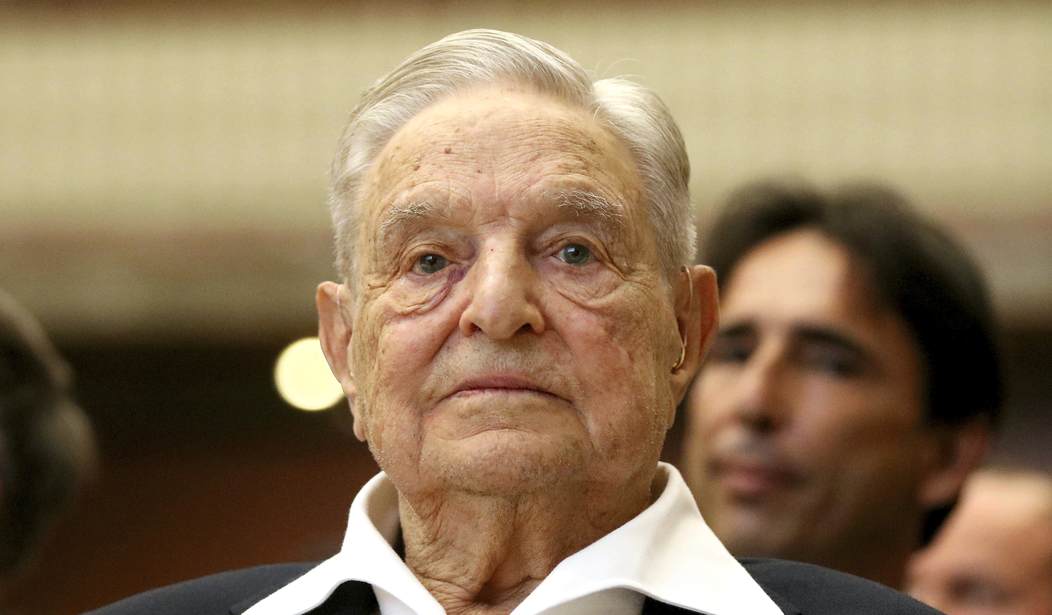Did the FBI do George Soros' dirty work in Operation Crossfire Hurricane? That claim comes from intel supplied to John Durham in a classified annex provided to a Senate committee at the end of his special-counsel investigation into the Russia-collusion hoax. The Biden administration kept that annex classified, and until today, the allegations from whistleblowers have been the subject of rumors, if known at all.
After Tulsi Gabbard declassified the annex with some redactions, Senate Judiciary Chair Chuck Grassley released it this morning. And hoo boy, it looks as though the Soros Foundation had its hands on this political dirty trick up to its elbows, if the testimony to Durham is accurate:
Newly-declassified so-called Clinton Plan intelligence included intercepted communications from a George Soros ally which suggested that Hillary Clinton’s 2016 campaign against Donald Trump was plotting a “long-term affair to demonize” Trump by linking him to Russian leader Vladimir Putin, and that the Clinton campaign expected that “the FBI will put more oil into the fire.”
The revelations, including intercepted purported communications from Leonard Benardo, a top official at George Soros’s Open Society Foundations, and communications by Clinton foreign policy adviser Julianne Smith, provide new insight into information that the U.S. intelligence community received in July 2016 – just before the FBI launched its politicized Crossfire Hurricane investigation. ...
“During the first stage of the campaign, due to lack of direct evidence, it was decided to disseminate the necessary information through the FBI-affiliated…technical structures… in particular, the Crowdstrike and ThreatConnect companies, from where the information would then be disseminated through leading U.S. publications,” the classified annex said. “The media analysis on the DNC hacking appears solid…. Julie [Campaign Advisor] says it will be a long-term affair to demonize Putin and Trump. Now it is good for a post-convention bounce. Later the FBI will put more oil into the fire.”
The purported emails added: “HRC [Hillary Rodham Clinton] approved [Campaign adviser Julie’s] idea about Trump and Russian hackers hampering U.S. elections. That should distract people from her own missing emails.”
“The point is making the Russian play a U.S. domestic issue… In absence of direct evidence, Crowdstrike and ThreatConnect will supply the media, and GRU [Russia’s Main Intelligence Directive] will hopefully carry on to give more facts," the alleged emails from Benardo said.
In other words, this was a political dirty trick that Democrats and their allies turned into a witch hunt for political purposes. The FBI at best got played by these operatives, and in some cases perhaps enthusiastically played along with them. Other materials recently declassified show that it wasn't just the FBI, either, but also intelligence-community leadership hoping to rinse the Clinton dirty trick as actionable HUMINT.
Matt Taibbi points that out today with a newly declassified whistleblower report. The unnamed source had attempted to alert Durham during the investigation about this overt effort to corrupt the intel process, only to have roadblocks repeatedly thrown in his way:
Tulsi’s new document is a whistleblower statement, from a former “Deputy National Intelligence Officer (DNIO) at the National Intelligence Council (NIC).” The former official’s story mostly surrounds his suppressed objections to the use of unverifiable evidence in the Russiagate assessment, and subsequent odyssey through the whistleblower bureaucracy. A tale I’d never heard before, that the dossier material was inserted during a car ride involving James Comey, James Clapper, and John Brennan, makes a cameo. The jokes write themselves:
An additional interesting angle has to do with the investigation of Special Counsel John Durham and the whistleblower’s apparent inability across years to connect with him, despite appearing to have evidence relevant to his probe. If you want to know why few people in federal service blow the whistle, this excerpt might offer insight:
The IC IG staff stated to me — for the first time — that the IC IG lacked a mechanism or authority to convey potentially relevant whistleblower information, regarding potential criminal activity, to the Department of Justice (DOJ) Special Counsel. IC IG staff acknowledged the possibility that I had witnessed malfeasance and events of possible relevance to ongoing criminal investigations being conducted by Special Counsel Durham, but the IC IG staff stated no procedure existed to pass information to DOJ investigators, save my taking action in personal capacity.
Taibbi calls this a catch-22, which is no joke. The whistleblower had protections if he worked through the IG, but it's not at all clear that would have applied if he went directly to Durham. Revealing this kind of information could have resulted in massive retaliation, if not malicious prosecution, from the people in this report. That doesn't sound like a catch-22 to me so much as it appears to be a deliberate attempt to obstruct a federal investigation, which might still interest the Department of Justice.
Of course, the Russiagate hoax looks like a target-rich environment for DoJ prosecutors, who are now engaged fully after Gabbard's referral. We still have not yet seen much of the "burn barrel" material discovered by Kash Patel and FBI investigators earlier this week either, nor heard an explanation for why it would have been set aside for destruction rather than proper storage and later review.
These e-mails in the Durham classified annex give us the clearest look at the overall intent of the Russia-collusion hoax, however, again assuming their accuracy. It looks entirely like an attempt to kneecap a duly elected president and undermine confidence in American elections to serve Democrats' interests in exercising power even after losing in 2016. One has to wonder what we'll find out about the 2020 and 2024 elections by the time the disclosures have all been made.









Join the conversation as a VIP Member